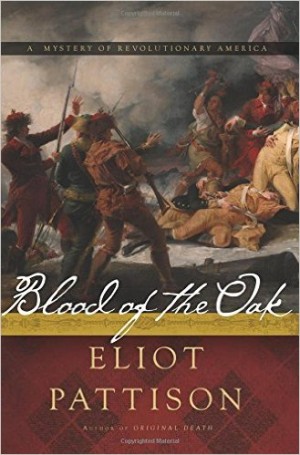
Blood of the Oak takes us back to Pennsylvania in 1765, when the British were still in control. Nominally. On the banks of the Susquehanna and Alegheny rivers, and further south in Virginia it’s not only the natives who are restless. A punitive stamp tax imposed on the colonies has the new Americans smarting, and resenting the King George and the British parliament across the sea.
Duncan McCallum is a physician of Scots heritage. Like many of his countrymen, he fled his homeland to escape the brutal recriminations following the Jacobite defeat at Culloden in 1746. His father and brothers were not so fortunate. McCallum has nightmares about his kin swinging from an English gibbet, food for crows and ravens. He has also developed an affinity with the natural medicine of the Iroquois people. When a tribal elder asks him to search for a missing artifact, he feels he has no option but to do as he is asked.
As he travels south from the settlement of Edentown, his search for the sacred object – a gruesome mask – becomes entwined with a battle between corrupt colonial officials, and an emerging network of citizens who sense that the time has come to resist British rule. Benjamin Franklin, currently living in London, is orchestrating things but communications between the pre-revolutionary leaders across the colonies have to be carried on horseback, and in code.
As McCallum and his companions fall into the hands of a corrupt group of officials, you may well ask how this book fits into the crime fiction genre. The answer is that McCallum is regarded by the native Americans as someone who talks to the dead. He can look at the dead and by a scientific examination of their wounds, determine how they died, and at whose hand. In this sense he is an early forensic investigator, and profiler. He comes to realise that preserving the lines of communication between dissidents of the 13 colonies is the most important task of his life.
As well written as this book is, it is certainly not an easy read. The intensely detailed accounts of the lore and mythology of the various Native American tribes will not be for everyone. Add to this to the serious and earnest tone adopted throughout, and you have a narrative which has a certain Lord Of The Rings feel to it, full of portent and pious intent. It also resembles a Tolkien novel in that the central character is sent on a quest. He is constantly on the move, but as he travels he meets various other characters who will all be reunited in a dramatic finale.
Producing convincing dialogue in a historical novel must be one of the biggest challenges facing an author. Vocabulary is one thing, but setting a tone that sounds authentic is another thing entirely. Pattison gets it just about right, and thankfully steers well clear of any phonetic horrors, despite having characters from a wide ethnic range.
This is an old fashioned historical melodrama, with few nuances between men and women of evil character and their more saintly opponents. As a dramatic historical and political thriller it ticks the boxes, and Duncan McCallum shows enough investigative ability to squeeze him into the genre of period crime fictional detectives. There is plenty of action, some graphic brutality, a fairly loaded historical narrative, and absolutely no sex. Despite the burning passion between McCallum and his mistress – in the sense that he is indentured to her as a servant – the closest they get is to touch fingertips.
Counterpoint
Print
£18.34
CFL Rating: 3 Stars









